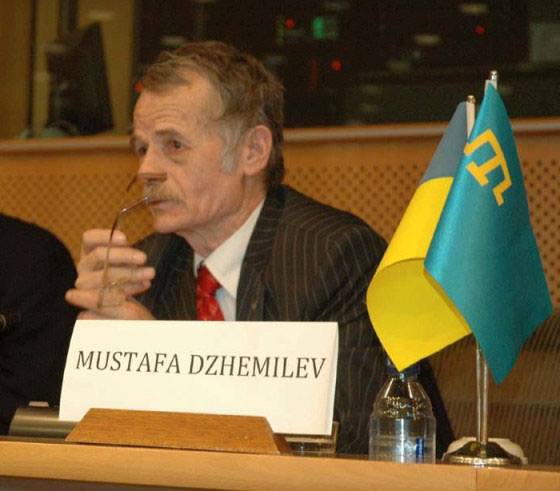
Human Rights of Crimean Tatars Discussed in European Parliament
Publication: Eurasia Daily Monitor Volume: 10 Issue: 179
By:

On September 26, the European Parliament’s (EP) Subcommittee on Human Rights held an urgent parliamentary hearing in Brussels and discussed the report titled, “The Pressing Situation in Regards to Human Rights of the Crimean Tatar people,” prepared by European diplomat Dirk Schuebel. The report included a brief historical background of the Crimean Tatars and their post-return situation in Crimea based on the European Union’s ongoing projects and monitoring in Crimea (https://www.nr2.ru/crimea/462346.html).
This hearing took place one week after a September 19 roundtable, during which the Ukrainian and Crimean authorities rejected European Commissioner for Enlargement and European Neighborhood Policy Stefan Fule’s recommendations about creating a legal framework for recognizing the Mejlis—the Crimean Tatar parliament—as well as the implementation of the International Forum for the restoration of rights to the formerly deported Crimean Tatars. The International Forum would have been held in 2014 under the auspices of the Organization for Security and Cooperation in Europe’s (OSCE) office of the High Commissioner on National Minorities (HCNM) (see EDM, September 27; https://www.unpo.org/article/16413). At the September 19 roundtable in Simferopol, Anatoly Mogilev, the chairperson of the Crimean Council of Ministers, told Fule that he did not recognize the Mejlis and its leadership, and that he would not communicate with the representatives of this “illegal organization” about matters involving deported citizens (https://15minut.org/article/mogilev-poskandalil-s-krymskimi-tatarami-pri-evrokomissare-2013-09-19-14-38). Mogilev’s conduct echoed the attitudes of pro-Russian, anti–Crimean Tatar political groups such as the Russian Block, Russian Community of Crimea and the Tavria Union, who jointly requested that President Viktor Yanukovych ban the Mejlis and its Qurultay (congress), calling them an illegal band of criminals in 2010 (https://www.rferl.org/content/Crimean_Tatar_Groups_In_Germany_Appeal_To_Ukrainian_President/2041406.html).
The Mejlis has been the representative body of the Crimean Tatars since its establishment in 1991 (Avdet Newspaper, Nos.15/16 (26/27), July 11, 1991). Although the Mejlis is not officially registered with the Ukrainian Ministry of Justice, it has been recognized by all the former presidents of Ukraine as well as international organizations, such as the OSCE and the UN. Its current head is the well-known Soviet-era Crimean Tatar dissident and human rights activist Mustafa Dzhemilev (https://www.stiftung-evz.de/fileadmin/user_upload/EVZ_Uploads/Publikationen/Englisch/evz_publ_mrb_130-165.pdf). The Mejlis has a history of openly supporting pro-Western Ukrainian politicians, and strongly backs Ukraine’s integration with Europe (https://www.turkishweekly.net/article/171/; https://www.tymoshenko.ua/en/article/8wmo62es; https://www.day.kiev.ua/en/article/day-after-day/mustafa-dzhemiliov-number-12-list-united-opposition-fatherland).
On September 29, following the EP subcommittee’s hearing on Crimean Tatars, the representatives of the Mejlis held a meeting with representatives of a German group, the “Via Cultus–State Political Society,” in Simferopol (https://qha.com.ua/obschestvennie-deyateli-germanii-posetili-medjlis-130537.html). According to Via Cultus’s leader, professor Karl-Georg Schreiner, the purpose of their visit was to gather information about the situation in Ukraine regarding the rights of national minorities. The German group included former members of the German parliament, academics, legal prosecutors, and representatives from various government agencies and community organizations. During the meeting, the Mejlis’s members shared with their visitors the history of suffering by the Crimean Tatars under the Communist regime of the Soviet Union, including the 1917 revolution, famine and red terror of the 1920s and 1930s, repressions in 1937, and the 1944 deportation. They also discussed the damage perpetrated by the Nazis, who destroyed over 100 Crimean Tatar villages during the occupation. The Mejlis representatives then brought up current problems such as the lack of national education opportunities in the Crimean Tatar language, which is defined as one of the “severely endangered languages of the world by the United Nations Educational, Scientific and Cultural Organization (UNESCO) (https://www.unesco.org/culture/languages-atlas/index.php).
At the conclusion of the joint meeting, Via Cultus’s Professor Schreiner said his colleagues plan to more widely promote Crimean Tatar issues and also support the holding of the International Forum in 2014 on the restoration of the rights of the Crimean Tatars (https://qha.com.ua/obschestvennie-deyateli-germanii-posetili-medjlis-130537.html).
On September 27, Ali Khamzin, the head of external relations of the Mejlis, stated that the September 26 hearing in Brussels as well as Via Cultus’s September 29 visit to Crimea was a breakthrough for Crimean Tatars. Khamzin stated that if Ukraine integrates into the European Union, it will also have to fulfill its obligations regarding the restoration of Crimean Tatar social, political and national rights (https://qha.com.ua/hearings-in-the-ep-is-a-breakthrough-for-crimean-tatars-129546en.html).
Despite the Crimean and Ukrainian authorities’ negative stance toward the hosting of the long-awaited International Forum on Crimean Tatar rights, the Mejlis is clearly willing to step up its efforts to make sure it occurs. On October 7, the Crimean Tatar organization declared that with the support of the European Parliament, the Council of Europe, the OSCE, the UN Office of the High Commissioner for Refugees (UNHCR), as well as the embassies of EU member states and the United States, Canada and Turkey, they were determined to carry out the International Forum in March–April 2014. In this statement, the Mejlis also affirmed its support for Ukraine’s EU integration and welcomed the Ukrainian government and opposition’s joint efforts to prepare the necessary legal framework for the signing of the Association Agreement with the European Union during Eastern Partnership summit in Vilnius on November 28–29 (qtmm.org/, October 7).
Yet, regardless of the Mejlis’s high expectations, the political will of the Crimean and Ukrainian authorities needs to change within the next six months for the Forum to take place. If Ukraine signs the Association Agreement in November, there might be a chance for a political paradigm shift in Ukraine. But a failure to move forward with the EU-Ukraine Association Agreement for one reason or another may remove any incentives to clear the muddy waters between the Mejlis and the authorities.




